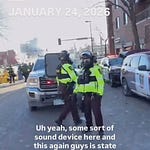Rocky Hernandez fought for the United States in Vietnam. Decades later, the country he served deported him—leaving him on the streets of Tijuana at 2 a.m. Today, in Mexico Hernandez leads a support center for deported veterans, surrounded by thousands of files detailing stories like his own.
July 23, 2025
by Nick Valencia
TIJUANA, MEXICO — When you walk into the office of the U.S. Deported Veterans, one of the first things you see isn’t its director Rocky Hernandez—it’s the massive steel filing cabinet next to him. Nearly every drawer is stuffed with folders, thousands of them, each one representing a deported U.S. military veteran.
Hernandez, a Vietnam War veteran, spends his days beside the files, each one proof that he’s not alone–but also a stark record of how the United States discards some of its soldiers.
“Every one of these is a soldier,” Hernandez says thumbing through the files. “They fought for the U.S., and now they’re here, like me.”
A Soldier Turned Exile
Hernandez fought in Vietnam but has spent the last nine years in Tijuana, deported during President Donald Trump’s first term. He admits he was the kind of immigrant Trump vowed to remove.
“I got in trouble,” Hernandez says. “I was the kind of guy he was talking about.”
When he was deported, Hernandez was dropped in Tijuana at 2 a.m., unable to speak Spanish and stripped of his cash.
“I started walking around, didn’t know where I was,” he recalls. “A guy who was on his way to work on the other side of the border asked me what I was doing. I told him, ‘I just got deported. I’m a veteran. I served the United States Army. And here I am.’”
The stranger paid for his cab fare, which dropped him at a shelter. Hernandez spent his first week sleeping on a cot in the director’s office, gathering the will to start over.
“I had to start all over. But I’m a soldier. Soldiers don’t give up.”
A Life Rebuilt, Piece by Piece
Now in his late 60s, Hernandez has rebuilt a life for himself. He learned Spanish on the job, rented a small apartment with help from locals, and earns about $2,000 a month between his U.S. military pension and his role as director of a support center for deported U.S. veterans.
“I still get paid from the U.S. military,” he says. “They pay me for my service, even though they deported me. I can’t go back to pick it up, so a friend brings me my money.”
As director, Hernandez offers food and help to veterans who arrive with nothing. “I can’t give them money, but I give them food,” he says, pointing to the cans of food and dry goods stacked in his office. “I know what it’s like to be lost. Some of them turn to drugs because they can’t handle being here. It’s too much for them.”
In the years since being deported, Hernandez said he’s never tried to go back to the United States. But, according to him, he could if he tried.
“I like it here,” he says.
“I Don’t Blame Nobody But Myself”
Hernandez is candid about his past.
“I don’t blame nobody but myself,” he says. “I got myself into this. I’ll get myself out.”
Before his deportation, Hernandez served a seven-year prison sentence after a fight outside a nightclub turned violent. He was deported soon after his prison release. His criminal record made him a target under Trump’s first term.
“I didn’t even know Trump had anything to do with it,” Hernandez says. “I just knew I got deported.”
When I ask if military service should have protected him, he shakes his head.
“I thought so too. But I learned the hard way—it doesn’t. They can still throw you out.”
Advice From Exile
For those fearing deportation, Hernandez has advice.
“The first thing you gotta do is don’t do drugs,” he says. “Stay out of trouble. There’s a lot of bad things that happen here in Tijuana. If you don’t want to get deported, stop what you’re doing and go in the right direction. Because when ICE comes, they don’t care. They take you right then and there.”
What about people who aren’t criminals but still live in fear? He struggles with that.
“I don’t know what to say,” he admits. “I did wrong. That’s why I’m here. If you don’t want to be like me—missing your family, suffering—then you gotta do the right things.”
“I’m Still an American Soldier”
Despite everything, Hernandez refuses to let deportation define him.
“I’m still an American soldier,” he says. “They can’t take that from me. I did my time. I earned that.”
Politics doesn’t interest him much.
“Trump, Biden—doesn’t matter. I just know Trump didn’t care about his soldiers. If I saw him, I’d tell him that. Look out for your soldiers.”
He glances back at the filing cabinets, his voice softening. “All these veterans,” he says. “Each one has a story like mine. Some worse. Some better. But all of them gave something for the U.S.”
As we walk out of his office, he points at the photos of soldiers on the wall.
“This gentleman right here, his name is Ruben Robles. They took him back.”
“So there is some hope?” I ask. “People, after they get deported, they do end up becoming citizens again to get back into the U.S.?”
“That’s why we’re here,” he smiles. “For that.”











